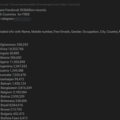
The Dutch cabinet will clarify what the controversial Data Processing by Partnerships Act, or WGS, will look like. Minister Yeşilgöz of Justice is starting a consultation on the question of which safeguards this law must meet.
Minister Dilan Yeşilgöz-Zegerius of Justice and Security is started an internet consultation for an amendment to the Data Processing by Collaborations Act. That law was passed by the House of Representatives at the end of 2020 and is now before the Senate, although the law is still receiving a lot of criticism. This WGS determines which partnerships within the Dutch government are allowed to exchange data about citizens with each other. The law provides a legal basis for exchanging that data between, for example, financial investigation services to combat fraud, or general investigative authorities to combat crime. The law has also been called ‘Super-SyRI’ by critics, a reference to the System Risk Indication that the government used for years to exchange data between ministries and other government institutions and to extract risk indicators from it using algorithms. SyRI was discontinued in 2019. Shortly afterwards it became apparent that work was being done on a successor to that system, namely the Data Processing Act for Partnerships. Tweakers wrote a background article about this in 2020 .
The minister wants to use the internet consultation to ask for reactions to a bill to amend the law. This specifically concerns an Order in Council in which it becomes clearer which partnerships will be created and which conditions they must meet. “In this way, questions from parliament and advice from the Netherlands Institute for Human Rights, the Personal Data Authority and information from the Advisory Division of the Council of State are also followed”, writes the minister.
In In the General Administrative Order, Minister Yesilgöz describes four specific partnerships. Those are existing partnerships. These are the Care and Security Houses, the Regional Information and Expertise Centers, the Financial Expertise Center and the Infobox Criminal and Unexplainable Assets. What they stand for and what they do, described to earlier. In the order in council, the minister describes, among other things, which safeguards they must meet. For example, the authorities must set up a lawfulness advisory committee that looks at the privacy impact and the risk of discrimination. It also contains information about the maximum retention period of data, what kind of data may and may not be collected, what must be included in annual reports and what the rules are when new partnerships are registered. The latter will then be done again via an Order in Council.











